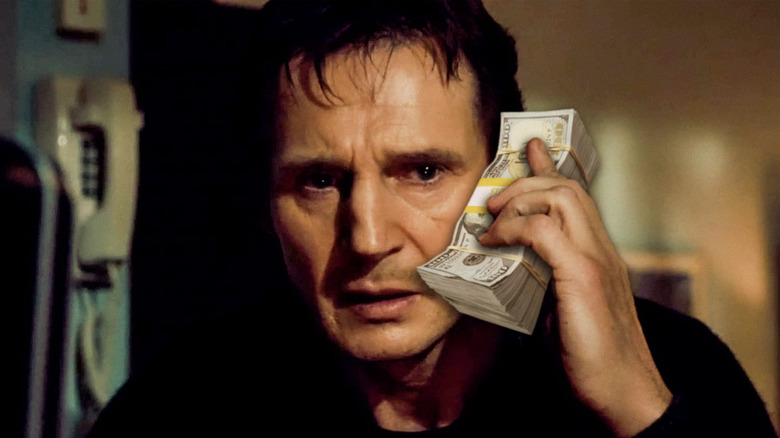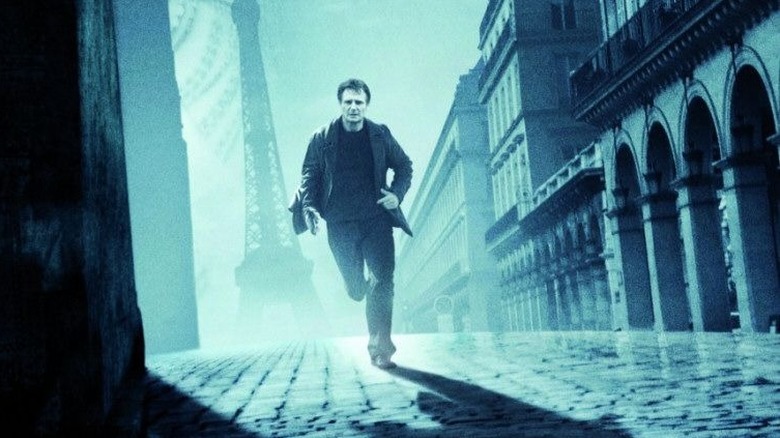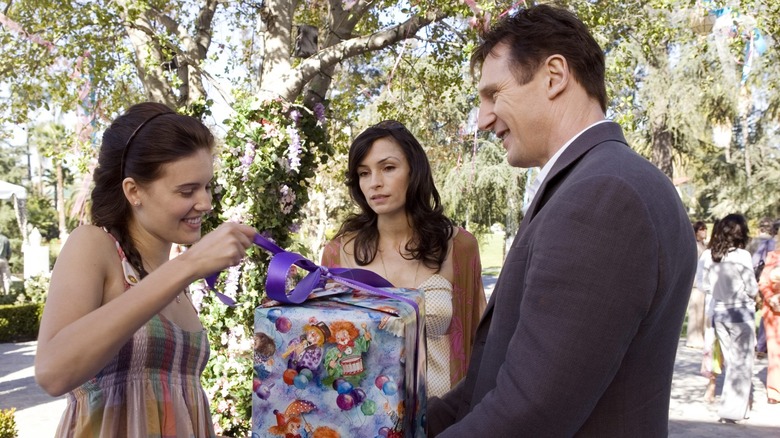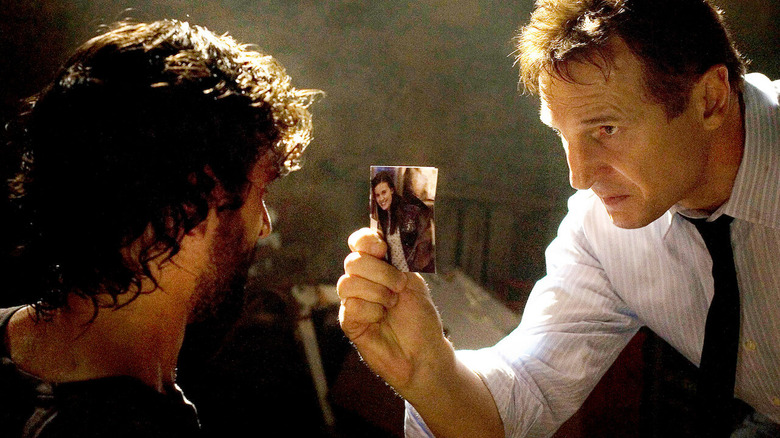Tales From The Box Office: Taken And Liam Neeson's Unexpected Action Star Makeover
(Welcome to Tales from the Box Office, our column that examines box office miracles, disasters, and everything in between, as well as what we can learn from them.)
Looking back at it, 2008 truly was a watershed year for the movie industry. It was the year that both "Iron Man" and "The Dark Knight" came out, essentially cementing the superhero movie trend as something far more than a fad that was going to burn out in a few years. It was a year that was dominated by both sequels and franchise-starters, including "Indiana Jones and the Kingdom of the Crystal Skull," "Sex and the City," "Madagascar 2," "Twilight," and "Kung Fu Panda." Yet, a movie that may get left out of the conversation a bit when looking at the biggest movies of 2008 is Liam Neeson's action/thriller "Taken."
Though North America didn't get to witness Neeson's out-of-nowhere turn as an action star until January 2009, "Taken" was originally released in France in 2008, setting up a wildly unlikely franchise and a hugely unlikely late-stage career change for Mr. Neeson. In honor of Neeson's latest action effort "Blacklight" hitting theaters this weekend. we're going to look back at how "Taken" came to be, what made it such a success, and what lessons the current Hollywood landscape could stand to gain from it. Let's dig in.
The Movie: Taken
The story starts with Luc Besson, director of "The Fifth Element" and "Leon: The Professional," who cooked up the idea for "Taken" and went on to write the screenplay with Robert Mark Kamen. When it came time to choose a director, he went to a longtime collaborator: Pierre Morel, who had worked with him behind the camera on both movies and commercials previously. At that point Besson pretty much handed the reigns over to Morel, who then had to figure out how to bring to life this tale of a father with "a particular set of skills" attempting to save his kidnapped daughter from a sex trafficking ring in Europe.
One interesting tidbit is that it was originally none other than The Dude himself, Jeff Bridges, who was supposed to play the lead role of Bryan Mills. Ultimately, he had to drop out and it fell to Liam Neeson — who, up to that point, had been known primarily as a dramatic actor, having appeared in Oscar-winners such as "Schindler's List." Yes, he had flexed his action muscles in movies like "Star Wars: The Phantom Menace" and "Batman Begins," but this was different. It was a more physically demanding role and it was a pure action flick, through and through. There wasn't much to hide behind. You don't have Batman or lightsabers there to bail you out if it doesn't all totally work.
But Neeson had an itch he wanted to scratch and threw himself into the role, dedicating months to prep time and training. This, despite the fact that he didn't actually have a ton of faith in the movie. Speaking with GQ in 2014, Neesons explained that he thought the movie was destined for the bargain bin and its success truly caught him off guard.
"I wanted to do more physical stuff. I really thought it would be kind of a little side road from my so-called career. Really thought it would go straight to video. But it just got great word of mouth. I was stunned."
Morel and Neeson were deliberate about the brand of action they were crafting with this film. Speaking to ComingSoon.net ahead of the film's U.S. release, Morel explained that they tapered the style of action to make sense for the character being portrayed.
"The agent that he's supposed to be, he just goes for the essentials. He's not fighting for the fun of making nice shots. He's just there to kill people, so we wanted to make it very, very fast, very realistic, very aggressive and have moves that a guy of his age would be able to do and would look real. There's no way he was going to do some Jackie Chan stuff or some Jet Li stuff, so we really planned and choreographed the fights accordingly to his very specific point of view and his capacity."
It all clicked. It found its way to theaters firing on all cylinders (for audiences anyhow) and proved to be a gigantic, unexpected success that transformed both Neeson's career and the landscape of action movies in Hollywood for the foreseeable future.
The Financial Journey
While January is often viewed as a dumping ground, it can be fertile soil for the right movie. "Taken" hit theaters on Super Bowl weekend in January of 2009 in the U.S. and, at the time, had the second-best ever opening weekend during the big game with $24.7 million (per Box Office Mojo). It ultimately grossed $145 million domestic and $81 million overseas for a phenomenal $226 million global haul, which is particularly impressive considering its $25 million budget. It didn't matter that critics were a bit mixed on it; the marketing put meat in seats and the lack of competition coupled with what looked to be a slightly out-of-the-box popcorn flick was enough to get people out of the house. Word of mouth did wonders for this one. And of course, let us not forget the now-infamous "I will find you, and I will kill you" speech.
All due respect to the supporting performances from the likes of Maggie Grace and Famke Janssen, it was Neeson's dedicated performance and unexpectedly effective turn in a true-to-form action flick that made this work like gangbusters, paving the way for two sequels and a global haul of $932 million for the franchise across a six-year span (per The Numbers). But the financial legacy this movie leaves behind goes well beyond a near $1 billion franchise.
For one, it completely gave Neeson's career new life and, well into his 50s, he became one of the premier action stars in the business. In the years that followed he would go on to star in a number of mid-budget action flicks such as "The Next Three Days," "Unknown," "The Grey," "Non-Stop," "Run All Night," "Walk Among the Tombstones," "The Commuter," and "Cold Pursuit," among others. And despite his approaching 70th birthday he's apparently still not tired, as evidenced by the release of "Blacklight."
Outside of Neeson's career, Hollywood looked at "Taken" as a model for success, with the door open for other slightly older action stars to be at the center of a hit film. There is no question that this movie helped pave the way for "The Expendables" franchise. Movies like Kevin Costner's "3 Days to Kill" and Keanu Reeves' 2014 franchise-starter "John Wick," which is arguably the greatest modern action franchise of them all. This movie changed the face of what an action star could be. It's not a stretch to say that maybe we wouldn't have gotten "John Wick" without "Taken."
The Lessons Contained Within
One of the biggest lessons right off the bat is to not be afraid to let an actor get out of their comfort zone. "Taken" was a $25 million movie that released at a time when the box office was a little more certain and the home video market could still bail films out on some level. There isn't nearly as much upside if you put an obvious choice in that role. The thing that made "Taken" click with the masses was that it felt so different and unique because Neeson definitely wasn't the obvious choice for an action movie star. But because he is an excellent actor and truly wanted to dedicate himself to the film rather than just collecting a paycheck, "Taken" was elevated from what might have been a forgotten-to-time bargain bin DVD. Risks taken with a reasonable amount of responsibility can pay off in a big way.
The other big lesson here is to not miss the point of what made something work in the first place. This franchise itself eventually became a lesson learned the hard way when the attempt was made to turn "Taken" into a TV show on NBC focusing on a young Bryan Mills. It scraped by for two seasons and hardly made an impact, with hardly anyone talking about it just a few years removed from its final episode. Meanwhile, we're still talking about Neeson's action flicks nearly 15 years later.
Hollywood learns the wrong lessons in attempting to emulate success far too frequently. When "IT" makes hundreds of millions of dollars, the lesson isn't "let's make other scary clown movies." That's missing the point. The Marvel Cinematic Universe successfully connects multiple superhero franchises together, but the lesson there wasn't "let's cobble together a shared universe of literally anything we have the rights to." (We're looking at you, Dark Universe.) People don't love the MCU because everything is connected. The movies are consistently entertaining and the source material already offered an expansive, connected universe to explore.
Take lessons from successes, especially in an era of wild uncertainty and feverish attention for subscribers in the streaming wars. Just try to learn the right lessons, and don't waste time trying to carbon copy lightning in a bottle.



